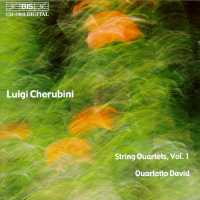|

Inspiring admiration

ROBERT ANDERSON examines Cherubini's quartets
Cherubini first came to London in 1784, composed an opera for the Theatre
Royal, and enjoyed friendship with the future George IV. Thirty years later,
when he had just completed his First String Quartet, he accepted an invitation
from the Philharmonic Society to provide for £200 a 'symphony, an
overture, and an Italian Vocal Piece for not less than three voices with
complete orchestral accompaniment, to be composed expressly for the Society'.
Cherubini was in England during Napoleon's Elba-Waterloo escapade, and
the Symphony in D was performed on 1 May 1815. Known primarily as a composer
for stage and church, Cherubini had less success with his instrumental music.
In 1829 he wrote a Lento for string quartet that was to become a replacement
slow movement for the Philharmonic symphony in its transposed guise as Quartet
No 2 in C. Beethoven's admiration for Cherubini's operas was reciprocated
by Cherubini's careful study of his younger contemporary's instrumental
music. Indeed he is reported to have said, 'If Beethoven had never written
a quartet I would write quartets; as it is I cannot.'
In 1838 these two quartets came to Schumann's notice. In the course of
his criticism he notes the difficulty a composer must face when tackling
an unfamiliar medium, and remarks that Cherubini had come shipwreck over
his symphony. In both quartets Schmann found passages that were operatic
and overladen. He was immediately enchanted, however, by the Scherzo in
No 1, 'with its fanciful Spanish theme'. [Click to
listen.] He was no less delighted by the thistledown trio, written in
a manner that Mendelssohn was to make so much of his own. [Click
to listen.] He likened the finale to a diamond that sparkles
brilliantly at every facet. The Second Quartet pleased him less because
of its orchestral textures. He felt a double failure was involved: the symphony
sounded too much like a quartet, and now the quartet was too symphonic.
Such arrangements were an affront to the original inspiration. He felt the
opening Allegro had an obvious debt to Beethoven's Fourth Symphony, but
during the Lento it was the music of Provence that came to mind. As in much
Cherubini, there were dry passages, but he relished also the contrapuntal
mastery that delighted in canonic ingenuity and cunning interplay of the
parts. His conclusion was positive: Cherubini's quartet style needed only
understanding to inspire admiration.
 The Quartetto David was founded in 1994 and has been coached
by members of the Amadeus Quartet. Reviews have commented on 'romantic enthusiasm'
and 'unending musical vitality'. Perhaps enthusiasm and vitality have sometimes
led the team astray, notably in the First Quartet. The quieter passages
have the requisite poise and sensitivity, with a pleasant range of tone
colours. The 'toujours également' passage in the Larghetto, played
raptly without vibrato, is an obvious success, as are the excerpts already
heard. More questionable is the harshness that can overtake some of the
faster music. The Second Quartet is an improvement. Here the many orchestral
tremolos are given a properly robust account, and the symphonic layout of
the brisker movements needs a good dose of enthusiastic vitality. Schumann's
Provençal theme in the Lento has the requisite lazy warmth. [Click to listen.] The second tune of the finale
likewise catches the playful and wayward character of the music. [Click to listen.] Now and again there is some effective
pizzicato from the cello and indeed the other instruments. If Cherubini
did not authorise this or the headlong accelerando that ends the quartet,
perhaps he should have done. The Quartetto David was founded in 1994 and has been coached
by members of the Amadeus Quartet. Reviews have commented on 'romantic enthusiasm'
and 'unending musical vitality'. Perhaps enthusiasm and vitality have sometimes
led the team astray, notably in the First Quartet. The quieter passages
have the requisite poise and sensitivity, with a pleasant range of tone
colours. The 'toujours également' passage in the Larghetto, played
raptly without vibrato, is an obvious success, as are the excerpts already
heard. More questionable is the harshness that can overtake some of the
faster music. The Second Quartet is an improvement. Here the many orchestral
tremolos are given a properly robust account, and the symphonic layout of
the brisker movements needs a good dose of enthusiastic vitality. Schumann's
Provençal theme in the Lento has the requisite lazy warmth. [Click to listen.] The second tune of the finale
likewise catches the playful and wayward character of the music. [Click to listen.] Now and again there is some effective
pizzicato from the cello and indeed the other instruments. If Cherubini
did not authorise this or the headlong accelerando that ends the quartet,
perhaps he should have done.
Copyright © Robert Anderson, November
13th 1999
 CD and purchase information
CD and purchase information
 |
To listen to the aural illustrations in this review,
you may need to download RealNetworks' realplayer G2. |
<< Music &
Vision homepage Christmas
music >>
|